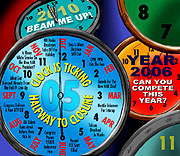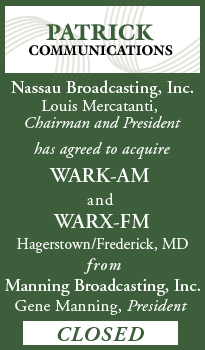|
|
|
Volume 22, Issue 89, Jim Carnegie, Editor & Publisher
|
Thursday Morning May 5th, 2005
|
|
|
Radio News®
|
|
 Suleman satisfied with national rep Suleman satisfied with national rep
A day after Cumulus Media's CEO threatened to fire Interep as his national rep (5/4/05 RBR #88), a Wall Street analyst wanted to know whether Citadel Broadcasting CEO Farid Suleman is satisfied with his rep. After all, it was just a year and a half ago that Citadel cancelled its contract with Interep and moved its national business to Katz.
 So, how are things going? Noting that his company is not in the top 10 markets, Suleman said there was a limit to what Citadel itself could do to affect national billings, but he said the company is working with its rep and even going direct to potential advertisers to help build national business. So, while he said he was not satisfied with national being up only 0.5% in Q1, he also isn't satisfied with local being up more than 2%. By the way, if Cumulus tries something new on the national field and it works, "we'll do the same," Suleman said. As for the other hot topic - - Clear Channel's Less is More initiative, Suleman said it is having some impact on pricing, which is good. However, he's not pushing advertisers to buy :30s or any other length of commercial - - it's up to the client to determine what they need. Suleman noted that some companies who have traditionally used :30s have been paying the same price as :60s for them, so he's not about to start offering :30s at 70-80% of the unit rate for :60s. So, how are things going? Noting that his company is not in the top 10 markets, Suleman said there was a limit to what Citadel itself could do to affect national billings, but he said the company is working with its rep and even going direct to potential advertisers to help build national business. So, while he said he was not satisfied with national being up only 0.5% in Q1, he also isn't satisfied with local being up more than 2%. By the way, if Cumulus tries something new on the national field and it works, "we'll do the same," Suleman said. As for the other hot topic - - Clear Channel's Less is More initiative, Suleman said it is having some impact on pricing, which is good. However, he's not pushing advertisers to buy :30s or any other length of commercial - - it's up to the client to determine what they need. Suleman noted that some companies who have traditionally used :30s have been paying the same price as :60s for them, so he's not about to start offering :30s at 70-80% of the unit rate for :60s.
Westwood One starts dividend, renews NFL
You can add Westwood One to the growing list of public broadcasting companies who are paying cash dividends to shareholders. The first quarterly payments of 10 cents per share will be paid May 31st to shareholders of record on May 20th. After generating 20.2 million in free cash flow in Q1, WW1 says it has the wherewithal to not only start paying a dividend, but to continue buying back shares of its own stock. To that end, company directors have authorized an additional 300 million in stock buybacks. The local/regional business of the Metro Networks division outpaced the national business of WW1's radio networks in Q1, with Metro revenues up 5.8%, while network revenues rose only 1.1%, so  CEO Shane Coppola is not satisfied with the network side of the business and is taking action to boost it. Nothing succeeds like success, so Coppola is focusing on the profitable sports side of WW1's network programming as a place for more growth. He announced that the company has renewed its contract with the NFL for an undisclosed number of years (more than three), including exclusive radio network rights to all Sunday and Monday might games. CEO Shane Coppola is not satisfied with the network side of the business and is taking action to boost it. Nothing succeeds like success, so Coppola is focusing on the profitable sports side of WW1's network programming as a place for more growth. He announced that the company has renewed its contract with the NFL for an undisclosed number of years (more than three), including exclusive radio network rights to all Sunday and Monday might games.
RBR observation: Will "Monday Night Football" be even better for Westwood now that the telecast will be only on ESPN, not free broadcast TV? More out-of-home sports fans will find themselves in places without cable, so they'll have to go with radio to follow the game. Coppola was also high on the new revenue that WW1 generated from its NCAA basketball deal with Sirius Satellite Radio. He likes being able to open new outlets to leverage WW1's content. The company currently gets 92% of its revenues from radio and 8% elsewhere (half of that from TV and cable), but he sees that 8% growing to 15-20% over the coming years.
 Commercials fair trade Commercials fair trade
for free programming
Arbitron and Edison Media Research have completed a study which shows that over 80% of Americans believe that being exposed to commercials is a fair price to pay for free programming. They also found that when it comes to overdoing it on commercials, most find TV a bigger culprit than radio - - and use their remotes to do something about it. In 1999, 84% of 12+ interviewees said commercials were OK, a number which hasn't changed much over six years - - 82% answered the question the same way this time around. Asked which medium, TV or radio, has the most commercials, TV was picked 71% to 22%, with 6% calling it a tie. TV did slightly better when asked about the intrusiveness of commercials, but still was far ahead in territory you don't want to occupy - - 67% said TVs commercials were most intrusive compared to 27% for radio. 4% said it both were the same. Radio's biggest advantage over TV, though, from an advertiser's perspective, concerns commerical zapping. 84% of radio listeners at work never or rarely change stations because a commercial comes on, a number that holds at 73% for at-home listeners. In the car, with push button controls, the number shrinks to 43% - - compared to 34% who usually or always change. That still beats TV, with its in-hand remote commercial zapping enabler. Only 19% never or rarely change channels, compared to 48% who usually or always change. More on this to come.
| See the channel zapping chart from Arbitron/Edison |
|
|
|
Nets team with watchdogs for content site
 Armed with a poll saying Americans believe by an eight to one margin that parental control should trump government control when it comes to deciding what children see on TV, a consortium of big networks and watchdogs from all points on the political spectrum has formed TV Watch (televisionwatch.org) to try and keep the government out of content regulation. TV Watch Executive Director Jim Dyke said, "The debate has been dominated by advocates of increased government control. TV Watch speaks for most Americans who today are not represented in the debate over rising government regulation of television programming and who want to protect their favorite shows from censorship. The only way to balance the public's competing interests and values is for concerned viewers to use the ratings and other parental controls, and our mission is to help them do it." The poll, conducted by Peter D. Hart Research Associates and the Luntz Research Companies, found that respondents favored parental over government involvement 86%-11%; that 91% think an individual may "often" be able to gind objectionable material on the air, but that "the sensitivities of a few should not dictate choices for everyone else." 66% say recent events are keeping content they want off TV as the industry reacts to the uncertain indecency climate. TV Watch includes three of the big four broadcast nets: NBC/GE, Fox/News Corp. and CBS/Viacom, along with organizations including American Conservative Union, Americans for Tax Reform, Center for Creative Voices in Media, The Creative Coalition, Media Freedom Project, The Media Institute, SpeakSpeak and the US Chamber of Commerce, along with numerous individual members. Armed with a poll saying Americans believe by an eight to one margin that parental control should trump government control when it comes to deciding what children see on TV, a consortium of big networks and watchdogs from all points on the political spectrum has formed TV Watch (televisionwatch.org) to try and keep the government out of content regulation. TV Watch Executive Director Jim Dyke said, "The debate has been dominated by advocates of increased government control. TV Watch speaks for most Americans who today are not represented in the debate over rising government regulation of television programming and who want to protect their favorite shows from censorship. The only way to balance the public's competing interests and values is for concerned viewers to use the ratings and other parental controls, and our mission is to help them do it." The poll, conducted by Peter D. Hart Research Associates and the Luntz Research Companies, found that respondents favored parental over government involvement 86%-11%; that 91% think an individual may "often" be able to gind objectionable material on the air, but that "the sensitivities of a few should not dictate choices for everyone else." 66% say recent events are keeping content they want off TV as the industry reacts to the uncertain indecency climate. TV Watch includes three of the big four broadcast nets: NBC/GE, Fox/News Corp. and CBS/Viacom, along with organizations including American Conservative Union, Americans for Tax Reform, Center for Creative Voices in Media, The Creative Coalition, Media Freedom Project, The Media Institute, SpeakSpeak and the US Chamber of Commerce, along with numerous individual members.
| Read TV Watch's invitation to join |
Anti-VNR bill survives conference committee
Sen. Robert Byrd's (D-WV) provision mandating clear sourcing on government-produced video news releases (VNRs) has made it through conference committee and is likely to be enacted into law. Written or spoken indentification must be included with any such material. The provision was tacked on to an emergency approprations bill. A move is still afoot in the Senate to pass a permanent law addressing VNRs - - that attempt will be introduced as the Truth in Broadcasting Act by John Kerry (D-MA) and Frank Lautenberg (D-NJ) (4/29/05 RBR #85). The Senate Commerce Committee postponed a hearing on the topic originally scheduled last week, and is expected to take up the matter before the month is out.
Stations honored for Service to America
The NAB Education Foundation (NABEF) has announced the winners of its 7th annual Service to America Awards, to be presented June 13th at the Service to America Summit in Washington, DC. The winners of the Crystal Radio Awards, announced last month at NAB2005 in Las Vegas, will also be honored at the summit.
| Here's a list of the Service to America winners. |
|
|
|
|
| Conference Calls Q1 2005 |
 Metro Networks drives Metro Networks drives
Westwood One growth
Although Westwood One is the nation's largest network radio company, it wasn't the network business that drove its growth in Q1, but rather the local and regional sales of its Metro Networks traffic/news business. Metro's revenues were up 5.8%, while network revenues rose only 1.1%. In all, revenues were up 3.5% to 134.1 million. However, operating income fell 5.7% to 29.2 million. That was attributed to expenses associated with warrants under its management agreement with Viacom's Infinity Radio and increases in programming, production and distribution expenses. For the rest of the year, WW1 is sticking with its guidance that revenues will be up in the low to mid single digits for 2005, resulting in operating income growth in the mid single digits.
Revenues rise at Citadel
Q1 revenues were up 5.9% at Citadel Broadcasting to a record 92 million. However, that included some recent acquisition. On a same station basis, revenues were up 2.2%. Station operating income shot up 9.9% to 35.6 million - - a 6.9% gain same station. CEO Farid Suleman noted that the West was the strongest region and continues to be strong, with the Southeast, Louisiana and sections of the Midwest the weakest. Among Citadel's strongest growth markets were Modesto, Albuquerque, Oklahoma City, Tucson, Allentown, New Orleans and Kokomo-Muncie, IN. The weakest markets were Portland, ME, Lansing, Knoxville, Colorado Springs, Saginaw and Lafayette, LA.
 TV and radio up double digits at Univision TV and radio up double digits at Univision
Net revenues shot up 23% to 433 million in Q1 at Univision - - exceeding the company's guidance that revenues would be up in the high teens. Radio revenues gained 11% to 71.5 million - - well ahead of the industry as a whole. But TV was even stronger, with revenues up 13% to 294.2 million. So, where did the 23% gain come from? Music division revenues jumped 135% to 62.2 million, in part because Univision is now required by new accounting rules to include a 50% owned record company. Even without that, though, music revenues were up 59% - - and total company revenues were up 14%. "Univision has been growing consistently and performing better than ever. This quarter, on 3 out of every 4 nights, the Univision Network delivered a larger Adult 18-34 audience than one or more of the 'Big 4' English-language networks among both Hispanics and non-Hispanics in primetime. We reached the largest television audiences in our history, solidified our leadership in Spanish-language radio, generated record-breaking sales in our music business and became the first Spanish-language website to be accredited by the MRC. Our unprecedented audience penetration across all of our platforms puts us in an ideal position as advertisers look to alternatives to the traditional English-language media outlets for their advertising dollars," said Univision President and COO Ray Rodriguez.
Cable gives News Corp. a boost
Ad growth at Fox News Channel helped boost cable network operating income by 55% to 172 million in fiscal Q3 at News Corporation. In the company's conference call, COO Peter Chernin noted that FNC's ratings are up 12% in primetime and has a larger audience than its competitors combined. Television operating income was down 15% for the quarter to 221 million, with higher profits at the Fox O&O stations and the STAR operations overseas offset by lower profits at the Fox network. Nevertheless, Chernin was upbeat on Fox. He said the network is poised to win the 18-49 demo for the current season, which puts it in a good position for the upfront. For the entire company, Q3 revenues were up 17% to six billion and operating income rose 9% to 889 million.
|
|
|
|
|
Adbiz©
|
MediaVest scores Mattel
Mattel Brands has selected MediaVest LA as its new planning agency for its 100 million planning account following a review. The toymaker will continue to use Group M's MindShare NY for children's TV buying and Group M's Mediaedge:cia NY for adult TV buying.
WellPoint in review
WellPoint, the nation's largest health insurance company, has begun a review for its 70 million advertising account. WellPoint is the result of the 2004 merger of WellPoint Health Networks and Anthem in a 16 billion dollar deal. The joint companies' 2004 revenue totaled 20.8 billion. WellPoint spent 13 million in measured media in 2004, according to TNS Media Intelligence. Anthem spent 4.4 million. Select Resources International LA is handling the review.
 GM closing in on end of media review GM closing in on end of media review
General Motors reportedly expects to make a decision in its review of its 2.8 billion media-buying account late this week or early next week. Both Interpublic Group, the incumbent, and Publicis Groupe are vying for the biz. The GM media-buying account is valued at 40 million-50 million in annual revenue to IPG.
|
|
|
|
| Radio & Television Business Report Magazine |
|
 June Magazine June Magazine
'05 Clock is Ticking -
Heading for Closure
National Sales:
EDI - Electronic Delivered Invoicing
Special Analysis:
Public now Go Private
Media, Markets & Money:
Shakers & Makers in the
Public Market
Reserve your Ad Marketing Space today. Advertising space is limited, contact:
June Barnes [email protected] ----- or ----- Jim Carnegie [email protected]
|
|
|
|
| Media Markets & MoneyTM |
Cave out in Buffalo Gap
Jason Cave's Easy Radio Inc. is selling WZXI-FM to Vox Communications, headed by Bruce Danziger and Ken Barlow. According to Snowden Associates broker Zoph Potts, the price for the FM News-Talker is 900K. Buffalo Gap is in an unrated portion of the state north of Lynchburg and not far from Staunton.
Free WILI
Art Rowbotham's Hall Communications is buying WILI AM & FM Willimantic CT from Michael Rice's Nutmeg Communications, culminating what Rice describes as a five-year search to find a new owner "...dedicated to the kind of community broadcasting that the WILI stations have delivered since 1959." The stations will be run along with Hall's stations in nearby New London, and the cluster GM there, Andy Russell, will fill that roll for the WILIs. Other than that, said Rowbotham, "It is our intention to keep the Nutmeg Broadcasting name in Willimantic and run the WILI stations in the same programing pattern they have followed in the past." He added that he'll try to keep the staff 100% intact other than the retirement and replacement of Rice.
|
|
|
|
| Washington Beat |
FCC waves four Eagles into Saga
The long-pending deal in which Eagle Broadcasting has proposed to sell four Ithaca radio stations to Saga Communications has been granted over the objections of local residents. A 13M deal for WTKO-AM, WQNY-FM, WHCU-AM & WYXL-FM was originally struck back in 2000. Last year, a new deal, with an additional 250K sweetener, was filed with the FCC. Numerous local citizens objected, saying an alternative market definition needed to be applied due an alleged limitation of listenable signals due to terrain characteristics. Saga and Eagle had noted that the cluster was approved twice before over local objections, when it was originally assembled by Eagle and when the licenses were renewed, arguing that if it was legal on both those occasions there was no reason it shouldn't be legal now.. The FCC noted that BIA reports a total of nine commercial and noncommercial stations in the market, seven of which have complete contour coverage. The remaining two, said the FCC, cover "virtually all of Ithaca." With less than half the market's stations, and no more than two in a service, the FCC found no cap problem with the cluster.
|
|
|
|
| Programming |
 Syndicator takes no-satellite vow Syndicator takes no-satellite vow
Saga CEO Ed Christian's decision to cancel any syndicated programs which also air on Sirius or XM is having an impact. Business TalkRadio Network and Lifestyle TalkRadio Network announced that they will not be airing any shows "in the future" that are distributed to either satellite company. Since that is only forward looking, it doesn't affect the four programs, out of 60 on the two related networks, which already air on satellite. "We applaud radio executives like Ed Christian of Saga who have the courage to stand up in opposition to what is obviously competition to terrestrial radio. Networks allowing their programs to air on satellite radio is no different than a local radio station allowing its personalities to broadcast their show on a competitor's station in the same market," said Jeff Weber, Exec. VP of the two networks in a statement. "Those of us in the radio industry have sat back long enough and allowed satellite radio to be perceived as more of a force than it really is. The time has come for there to be more of a concerted effort on the part of all of us, particularly the NAB and RAB," he added.
WQSR Baltimore is latest Jack format
Infinity's Baltimore Oldies WQSR-FM has flipped to the "Jack" format after 17 years on the air. Some reports say the airstaff may have been fired in the process, including the morning team of Rouse & Co.
|
|
|
|
| Ratings & Research |
Sponsorship Scorecard re-signs the Reds
Nielsen Sports and the Cincinnati Reds announced the renewal of their license agreement for Sponsorship Scorecard), the service that measures sponsored placed media in all televised sporting events. "The Sponsorship Scoreboard service has been of great value in our retention of existing partnerships and our ability to obtain new sponsors," said Cal Levy, Reds' director of marketing. "We feel we are a very competitive buy and this tool gives us another way to prove our point to sponsors."
|
|
|
|
| Transactions |
1.7M KTCM-FM Wichita KS from Maria Salazar to Connousseur Media LLC (Jeffrey D. Warshaw, Michael D. Driscoll). 85K escrow, balance in cash at closing. Duopoly with FM CP Augusta KS. [File date 4/7/05.]
220K KQNS-FM Linsborg KS from B-B Broadcasting Inc. (Elizabeth A. Chalmers) to NRG Media LLC (Norman W. Waitt Jr., Mary Quass et al). Cash. Duopoly with KILS-FM Minneapolis KS. LMA 6/1/00, purchase option 2/1/02. [File date 4/7/05.]
|
|
|
|
| Stock Talk |
GM move cheers markets
Investors got a little bolder on Wednesday after seeing value investor Kirk Kerkorian move to increase his stake in General Motors. The Dow Industrials rose 128 points, or 1.2%, to 10,385.
Radio stocks went along for the ride. The Radio Index rose 3.561, or 1.8%, to 203.753.
Salem, which reports earnings today, shot up 7.2%. Entravision rose 4.8% and Regent gained 4.4%.
|
|
|
|
| Radio Stocks |
Here's how stocks fared on Wednesday
| Company |
Symbol |
Close |
Change |
Company |
Symbol |
Close |
Change |
|
Arbitron
|
ARB
|
|
39.53
|
-1.46
|
Jeff-Pilot
|
JP
|
|
50.91
|
+1.01
|
|
Beasley
|
BBGI
|
|
16.95
|
+0.16
|
Journal Comm.
|
JRN
|
|
16.36
|
+0.38
|
| Citadel |
CDL |
|
12.57 |
+0.22 |
Radio One, Cl. A
|
ROIA
|
|
13.46
|
+0.04
|
|
Clear Channel
|
CCU
|
|
31.63
|
+0.41
|
Radio One, Cl. D
|
ROIAK
|
|
13.51
|
+0.03
|
|
Cox Radio
|
CXR
|
|
15.56
|
-0.01
|
Regent
|
RGCI
|
|
5.90
|
+0.25
|
|
Cumulus
|
CMLS
|
|
12.50
|
-0.02
|
Saga Commun.
|
SGA
|
|
14.31
|
+0.22
|
|
Disney
|
DIS
|
|
26.79
|
+0.54
|
Salem Comm.
|
SALM
|
|
20.21
|
+1.35
|
|
Emmis
|
EMMS
|
|
15.77
|
unch
|
Sirius Sat. Radio
|
SIRI
|
|
5.23
|
+0.17
|
| Entercom |
ETM
|
|
32.27
|
+0.76
|
Spanish Bcg.
|
SBSA
|
|
8.45
|
+0.13
|
|
Entravision
|
EVC
|
|
7.90
|
+0.36
|
Univision
|
UVN
|
|
27.64
|
+0.82
|
|
Fisher
|
FSCI
|
|
48.20
|
+0.50
|
Viacom, Cl. A
|
VIA
|
|
36.27
|
+0.98
|
|
Gaylord
|
GET
|
|
41.70
|
+0.65
|
Viacom, Cl. B
|
VIAb
|
|
36.15
|
+1.03
|
|
Hearst-Argyle
|
HTV
|
|
24.88
|
+0.08
|
Westwood One
|
WON
|
|
19.22
|
+0.78
|
|
Interep
|
IREP
|
|
0.45
|
-0.08
|
XM Sat. Radio
|
XMSR
|
|
28.23
|
+0.71
|
|
International Bcg.
|
IBCS
|
|
0.01
|
unch
|
-
|
-
|
- |
-
|
-
|
|
|
|
|
|
|
Bounceback
|
 We want to We want to
hear from you.
This is your column, so send your comments to [email protected]
Should radio be referring to iPods? Here's a reader's comment on our recent stories.
 With the momentum building across the U.S. for JACK-like radio formats, reference on these stations to iPods "on shuffle," etc seems to be pervasive. Is this a good idea? Or is radio simply promoting attrition to new technologies. With the momentum building across the U.S. for JACK-like radio formats, reference on these stations to iPods "on shuffle," etc seems to be pervasive. Is this a good idea? Or is radio simply promoting attrition to new technologies.
You are the first person to bring this up.....
They are saying this to their listeners, "We know that you would rather be listening to your iPod right now, but because you can't, we are going to try to be like an iPod." That would mean that an iPod is clearly better than radio and what you should be listening to.
Radio makes a lot of mistakes in marketing, and this is just another one. Same as putting down Satellite radio in the spots they recorded. The analogy would be a guy keeps talking about his old girl friend while trying to get to second base with his new date. Why talk about her? Why keep throwing this up in her face? Why not just play lots of great music and sound like you are having fun doing it. I am missing something, or has radio gotten a little defensive in its old age?
Dwight Douglas
|
|
|
Upped & Tapped
|
Mayfield shifts
to Eastman
Mark Mayfield, most recently VP/Sales Manager of Christal Radio, has moved to Katz stable mate Eastman Radio as VP/Sales Manager in Atlanta.
Ryan goes network
Sporting News Radio has promoted the GM of its O&O KMPC-AM Los Angeles, John Ryan, to Vice President/Sales for the network. He will continue to be based in LA.
|
|
|
TVBR - TV News
|
Sook to Moonves: Thanks, Les!
Perry Sook now has a powerful ally in Nexstar Broadcasting Group's efforts to win retransmission payments from the major MSOs. With Viacom set to split in two,  Sook told analysts that it will be a big plus to have Les Moonves demanding retransmission payments for the CBS O&Os in large markets (5/3/05 TVBR #87), just as Nexstar is already doing in smaller markets. Sook says advertisers who'd left the Nexstar and Mission stations in Joplin, MO, Shreveport, LA and San Angelo and Abilene, TX have been coming back, after seeing the results of the February sweeps, where the stations were generally flat and even up in local news in some cases, despite not being on cable. "The impact to us is decreasing as time goes on," Sook said. The Nexstar CEO isn't tipping his hand on just what his strategy will be as additional cable retransmission contracts come up at the end of this year and in early 2006. He noted, though, that Nexstar has successfully negotiated for cash compensation from some cable operators - - just not any of the big 10 MSOs (at least, not yet). Sook also said he was approached by three groups at NAB2005 who wanted to conduct conference calls with Nexstar management so they could benefit from the company's experience in challenging the MSOs. Sook told analysts that it will be a big plus to have Les Moonves demanding retransmission payments for the CBS O&Os in large markets (5/3/05 TVBR #87), just as Nexstar is already doing in smaller markets. Sook says advertisers who'd left the Nexstar and Mission stations in Joplin, MO, Shreveport, LA and San Angelo and Abilene, TX have been coming back, after seeing the results of the February sweeps, where the stations were generally flat and even up in local news in some cases, despite not being on cable. "The impact to us is decreasing as time goes on," Sook said. The Nexstar CEO isn't tipping his hand on just what his strategy will be as additional cable retransmission contracts come up at the end of this year and in early 2006. He noted, though, that Nexstar has successfully negotiated for cash compensation from some cable operators - - just not any of the big 10 MSOs (at least, not yet). Sook also said he was approached by three groups at NAB2005 who wanted to conduct conference calls with Nexstar management so they could benefit from the company's experience in challenging the MSOs.
TVBR observation: It looks like we'll be covering a widespread and heated battle next year. Some TV groups have managed to finesse the MSO refusal to pay for retransmission consent by making deals for related cable channels and such. To date, that has kept the O&Os of ABC, CBS, Fox and NBC from a head-to-head battle with cable. But that will change when Viacom splits and CBS no longer has any sister cable channels. Smaller operators, such as Nexstar, didn't have much leverage in the past, so they essentially had to give away their product for resale by the cable systems. What's changed is that EchoStar and DirecTV are now viable competitors to cable, particularly in markets where they are offering local-into-local - - and both are paying for retransmission consent. The rules of the game have changed and the broadcasters are now able to stand up and demand payment from cable. Sook fired the first shot and now needs the rest of the industry to line up beside him.
|
|


|
RBR Radar 2005
|
|
Radio News you won't read any where else. RBR--First, Accurate, and Independently Owned.
|
RBR News Analysis
NBC doesn't get it - Radio's Opportunity to Cross Platform
Here is the real kicker:
It's interesting when you look at the TV landscape and how they just move shows around and hope you find them, but what is more appalling on the marketing side in the case of something like "American Dreams". Here you have a scripted show that features a built in marketing component that is and has been grossly overlooked: Current artists redoing great songs from the 60's, how does NBC not set up a deal with every R&B station not to play Usher covering Marvin Gaye or John Legend doing Stevie Wonder? It's a built in day-after promotion on radio, or better yet, play it the day of the program to hype the show. Why NBC wouldn't cut a deal with radio, which by the way is the number one way to drive tune-in, to run these songs to promote the show? The redone songs are fantastic and radio would embrace them. Think about it, the number one show (American Idol) is amateurs covering old songs. Does it get any better than current hot artists today doing the same in a drama series? It's a marketing home run. Hopefully, somebody in the TV network business with some marketing sense picks up American Dreams and figures out how to drive viewers. Publisher observation: Remember: Coke, Fox TV, with 'American Idol' - here was that secret ingredient to the success from the start with 'Idol' - Clear Channel Radio. Now all of radio, especially Oldies and CHR personality-driven stations, this is your once in a lifetime programming shot to do as CC Radio did. You can do it locally and put the pressure on and recommendation to your local ABC or Fox affiliate to make a call to Hollywood. TV networks may never understand that content is king. 05/04/05 RBR #88
Cumulus threatens to quit Interep
Reporting that local sales were up in Q1, but national sales were, again, down, Cumulus Media CEO Lew Dickey set a 30-day deadline to make a change. either Interep's Cumulus Radio Sales will adopt that types of new business initiatives and accountability that Cumulus has adopted for its local sales, or Cumulus will take its national business elsewhere, either to another rep firm, or create an in-house national rep. RBR observation: It's not that Lew is anxious to jump to Katz as Citadel did a little over a year ago. Rather, he's complaining that the national rep business isn't structured for growth. He thinks both rep companies are too focused on continuing business from existing national advertisers, rather than working to expand the mix of advertisers and build new business. Meanwhile, Guild has to keep his clients happy while he fends off a hostile bidder and seeks to recapitalize Interep. We'll be watching to see how this plays out.
05/04/05 RBR #88
Bidders eying CC Entertainment
Clear Channel's plans to spin CC Entertainment off into a separate company has apparently prompted interest from people who want to buy the operation, rather than see it become an independent company. Both House of Blues and Jam Productions told the news service they're working on financing to try to acquire at least the concert portion. Dave Lucas, the former CC Music CEO who now heads Live 360, is reportedly putting together a bid for the entire company.
RBR observation: Whatever happens, Clear Channel shareholders are going to get considerably less than what the company paid in 2000 for what was then SFX Entertainment - - 4.4 billion. Estimates are that the company is now worth less than two billion, maybe as little at 1.5 billion. It seems unlikely to us that Clear Channel would agree to sell only the concert business, which would leave it stuck with other units for which there would be few bidders - - and not enough to spin off into a separate public company. 05/04/05 RBR #88
|
|
|
|
 |
LSM-Suburban Chicago
NextMedia - Joliet, IL looking for a LSM who will keep the momentum going and build on it. Four station cluster has grown significantly if you can do the job, fit into a strong team come join us.
Details see Radio Careers
For Confidential Placement Contact: Cathy Carnegie, VP, [email protected]
|
 |
|
|
|
|
Help Desk
|
Having problems with our epapers?
Please send Questions/Concerns to:
[email protected]
If you wish to remove your name completely from our database use this link __UNSUB__
If you wish to unsubscribe
to RBR only, use this link
|
|
|
|
©2005 Radio Business Report/Television Business Report, Inc. All rights reserved.
Radio Business Report -- 2050 Old Bridge Road, Suite B-01, Lake Ridge, VA 22192 -- Phone: 703-492-8191
|
|